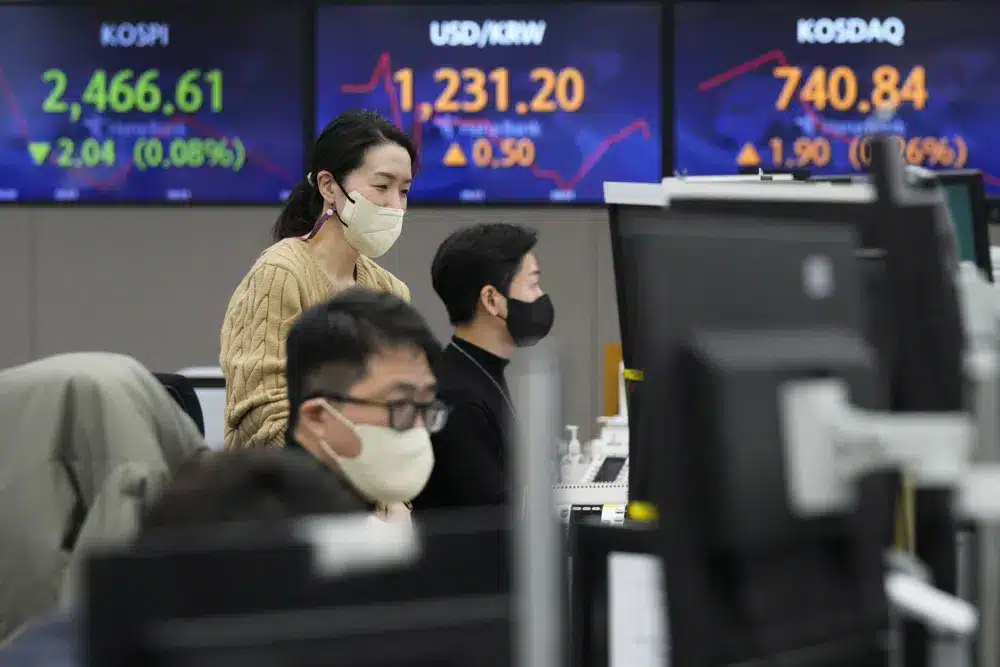TOKYO, Japan — Asian stocks rose Friday, tracking a Wall Street rally fueled by reports that the economy and corporate profits may be doing better than expected.
In Tokyo, the core consumer price index rose 4.3%, slightly higher than the 4.2% expected and higher than the Bank of Japan’s 2% target.
“This seeks to challenge the central bank’s eventual policy shift, though the government’s energy subsidies next month could be used to delay any changes for the time being,” said Yeap Jun Rong, a market analyst at I.G., in a commentary.
The Nikkei 225 index in Japan rose nearly 0.1% in morning trading to 27,380.11. The S&P/ASX 200 index in Australia rose 0.5% to 7,503.50. The Kospi in South Korea rose 1.2% to 2,497.05. The Hang Seng Index in Hong Kong was unchanged at 22,571.58.
Shanghai’s markets remained closed for the Lunar New Year holiday.
Wall Street stocks went up to their highest level in almost eight weeks after the Commerce Department said that the U.S. economy grew at a 2.9% annual rate in the fourth quarter. This suggests that the economy will still be growing at the end of 2022, even though interest rates are going up and many people are worried about a recession. This exceeded economists’ expectations of a 2.3% increase.
Wall Street Getting A lot Of Earnings And Economic Reports
The S&P 500 rose 1.1% to 4,060.43, its highest finish since December 2. The Dow rose 0.6% to 33,949.41, while the Nasdaq rose 1.8% to 11,512.41.
Wall Street is getting a lot of earnings and economic reports, which could lead to more volatility. Markets have recently swung up and down as fears of a severe recession and a drop in profits compete with hopes that the economy can manage a soft landing and that the Federal Reserve will lower interest rates.
Other information On Thursday, factory orders for durable goods went up more than expected in December, and less people than expected applied for unemployment benefits the week before.
Strong data show that the economy can handle the Fed’s avalanche of rate hikes last year and at least one more expected next week without crashing into a deep recession. Higher interest rates are designed to slow the economy by making it more expensive to borrow money to buy a house, a car, or anything else on credit. They also cause stock and other investment prices to fall.
But if the economy is stronger than expected, especially in the job market, the Fed may have to keep rates high for longer to make sure inflation is really crushed. The Fed has repeatedly stated that it intends to do so until the end of the year, though many investors do not appear to believe it.
The Report Shows Good News
The 10-year Treasury yield, which helps set rates for mortgages and other important loans for the economy, increased to 3.49% from 3.45% late Wednesday. The two-year yield, which tends to track expectations for Fed interest rate actions more closely, increased to 4.18% from 4.13%.
At first glance, Thursday’s economic report seemed to be good news. However, it also showed some worrying signs of a slowdown. According to Megan Horneman, chief investment officer at Verdence Capital Advisors, it is also backward-looking.
“The first half of this year is going to be tough,” she predicted, citing recent weakness in the economy’s manufacturing and services sectors.
On the earnings front, news from some big tech companies gave people more reason to be optimistic a day after Microsoft’s forecasts made people worry.
Tesla went up 11% after the company that makes electric cars said that its profit for the last quarter was higher than expected. Seagate Technology rose 10.9% after reporting higher-than-expected revenue and earnings.
Steelmaker Nucor was also among the top-performing stocks in the S&P 500, rising 8.4% after exceeding profit and revenue forecasts by Wall Street.
Sherwin Williams Was On The Wrong Side Of Wall Street
Chevron rose 4.9% after raising its dividend and approving a stock repurchase program worth up to $75 billion. Both moves put money directly into shareholders’ pockets, which drew criticism from Washington. Instead, according to White House spokesman Abdullah Hasan, oil companies should “use their record profits to increase supply.”
Sherwin Williams was on the wrong side of Wall Street. It fell 8.9% after reporting lower-than-expected revenue for the most recent quarter. It also provided a profit forecast for the coming year that fell far short of analysts‘ expectations, as a weak housing market weighs on demand for paint.
Despite reporting profit and revenue that met Wall Street’s expectations, IBM fell 4.5%. Analysts pointed to some lower-than-expected numbers in terms of cash generation.
Southwest Airlines lost more money than expected in its most recent quarter, which was hurt by the fact that more than 16,700 flights had to be canceled last month. It also stated that it expects to lose money in the first three months of 2023.
On the New York Mercantile Exchange, benchmark U.S. crude rose 21 cents to $81.22 per barrel in electronic trading. On Thursday, it fell 14 cents to $81.01.
Brent crude, the international benchmark, rose 17 cents to $87.64 per barrel in London.
The U.S. dollar fell to 129.83 Japanese yen from 130.23 yen in currency trading. The euro is now worth $1.0877, down from $1.0890.
SOURCE – (AP)












